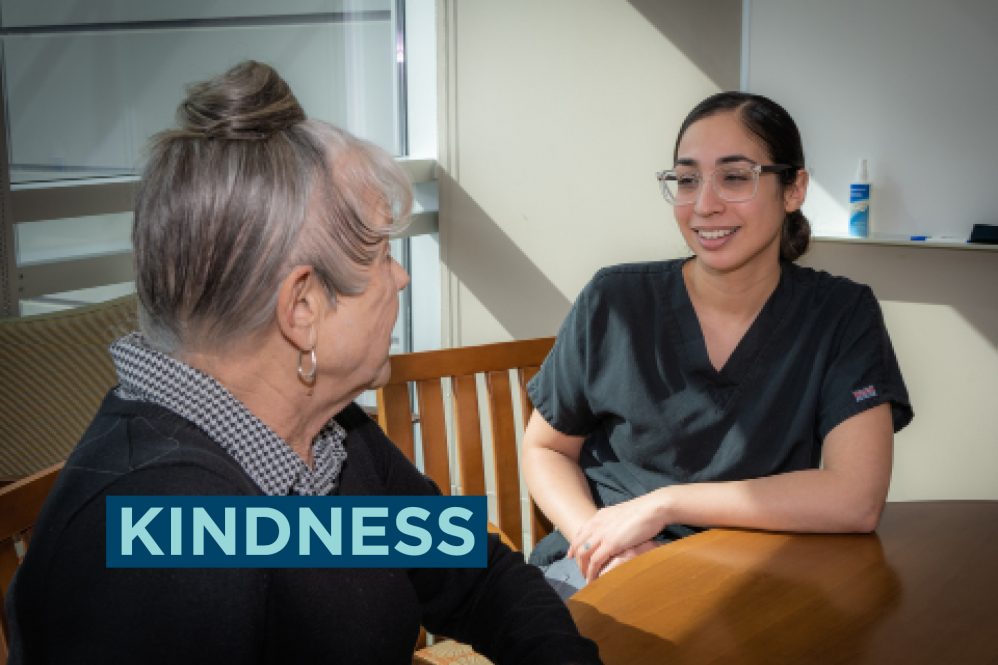Kindness can mean different things to different people, for some it means a simple smile, compliment, or gesture such as holding open a door, for others a larger offering such as a gift or service. Whatever kindness means to you, there is no denying that giving or receiving kindness always makes us feel good.
Crystal Trabal, a medical assistant at the UConn Center on Aging, knows all too well the importance of kindness in her role. Trabal has worked at UConn Health for over six years and in her position, she works with a very complex group of patients who require patience, compassion, and kindness due to cognitive issues, mobility, and complications that come with aging.
“Kindness to me is showing compassion, being pleasant, and devoting time to listening,” says Trabal. “These qualities have shown to add value to my patients, family members, and coworkers.”
“I have always been impressed with Crystal’s cheerfulness, professionalism, and way with our older patients,” says Dr. George Kuchel, director, UConn Center on Aging.
Understanding her patients’ complex issues helps her extend an abundance of kindness to those around her.
“A show of a simple compliment can improve well-being, bringing a sense of meaning to patients, and workers alike,” says Trabal.
Kindness is an integral part of the patient experience. Research has shown that patients who receive compassionate, patient-centered care are more satisfied and willing to comply with their medical treatment, which leads to positive patient outcomes.
“UConn Health is dedicated to helping people in promoting health and wellbeing,” says Trabal. “Making sure patients are cared for, respected, and valued are ways to achieve UConn’s mission; for me, this is going above and beyond in meeting the needs of each patient.”
“Crystal is a very kind and engaging person. I have witnessed her interactions with patients and their family members on many occasions and have always found her to be compassionate and understanding,” says Dr. Patrick Coll, medical director for Senior Health at the UConn Center on Aging. “Most of my patients know her by name and many reach out to her directly if they have a concern or question. She has a very challenging job that she handles with equanimity.”
A recent experience Trabal had was when a patient called at the end of the shift because her appointment had been canceled and she needed to be rescheduled. The patient was very upset and started yelling. Trabal acknowledged her frustration and agreed to stay late to help her reschedule. The earliest appointment was with another provider and the patient was hesitant but with reassurance, from Trabal she agreed.
“She could not understand how I remained so calm even after she was yelling at me,” says Trabal. “She was thankful that I showed such patience in finding her appointment and when the patient arrived at the clinic for her appointment, she wanted to meet with me, where she hugged and thanked me again.”
“She has been contributing to the clinic and patients’ care far beyond what is typically the role of a medical assistant,” says Dr. Yazeed Maghaydah, co-director of the Memory Program at the UConn Center on Aging.
“She is always smiling, and cheerful and brings a positive feeling making it feel like home and family for both patients and coworkers.”
Kindness comes in the form of offering a listening ear and encouraging words when needed, which is always helpful with this population. The patients she works with are sometimes lonely and are looking for someone to talk to, which can sometimes be a challenge to end a phone conversation when you know the patient wants to talk.
“Being able to show that we care and make a person feel valued are ways to show kindness,” says Trabal.
“Kindness can be as simple as a smile.”
“The thing I love most about my job is the personal connection that I am able to make with patients,” says Trabal. “Also being able to work alongside providers to provide support in taking care of the patients and the staff who continue to help me grow in my position.”
“Being compassionate and kind is key to good geriatric care and Crystal exemplifies this attribute every day that she works here at UConn Health,” says Coll.
“You never know what someone is going through, but you can never go wrong with being kind,” says Trabal.



